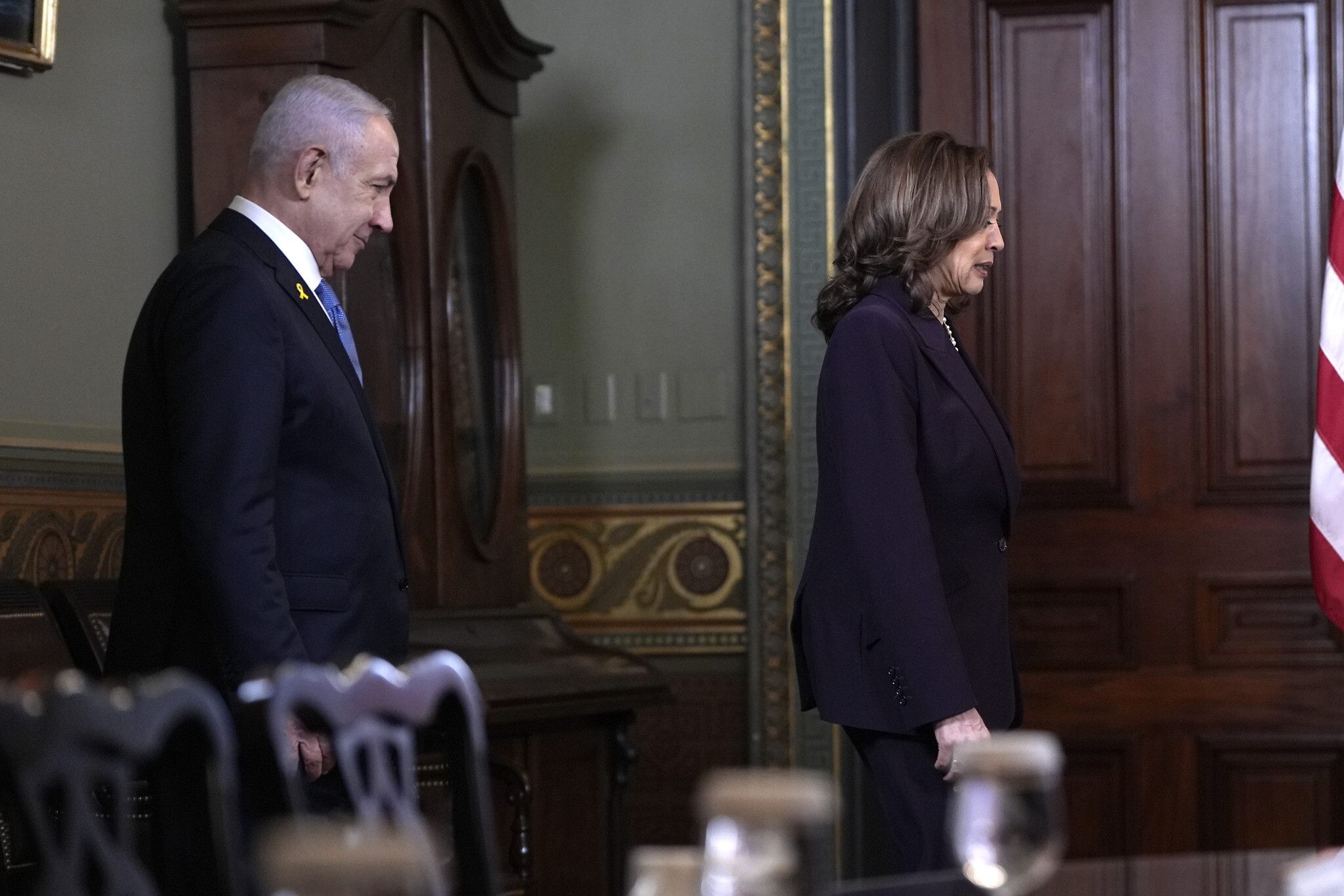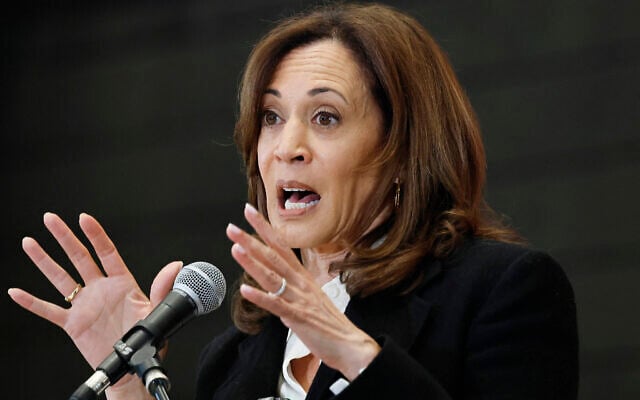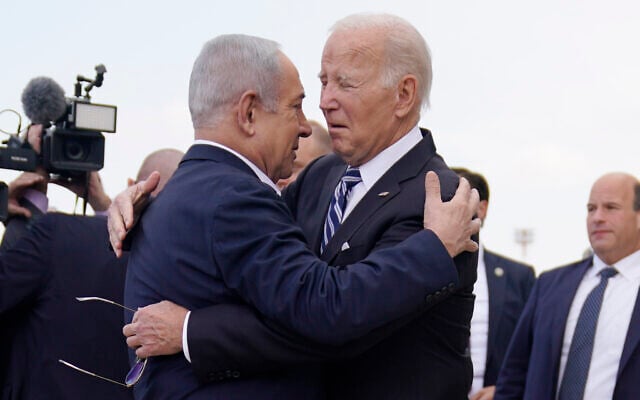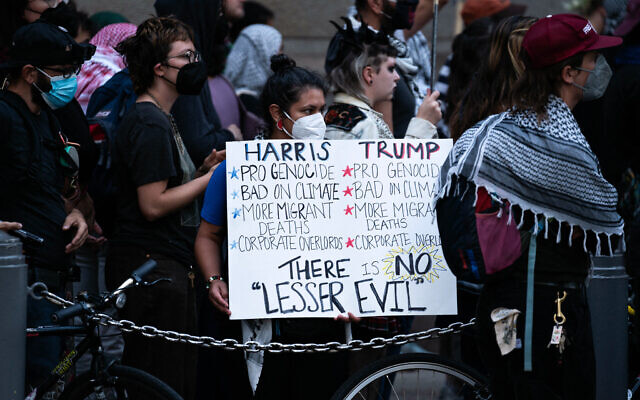


Former US vice president Kamala Harris has written that former president Joe Biden could not show enough empathy toward Gazans, according to excerpts published by Axios Tuesday from “107 days,” Harris’s upcoming account of her failed 2024 presidential campaign.
According to the outlet, Harris says in the book that her campaign was hurt by Biden’s unpopularity, fueled in part by the “perceived blank check” he gave Prime Minister Benjamin Netanyahu to respond to the Hamas onslaught of October 7, 2023. Protests against the ensuing war in Gaza played a role in the selection of Harris’s running mate on the Democratic ticket, she writes.
Axios suggested that the book contradicts statements from the Biden-era White House that there were no disagreements between him and Harris over Gaza. A Harris spokesperson declined Axios’s request for comment, and a Biden spokesperson did not respond to a request for comment, the outlet said.
In the book, released later Tuesday, Harris said Biden was unable to show Palestinians in Gaza the same grace he showed Ukrainians after Russia invaded their country in 2022.
“I had pleaded with Joe, when he spoke publicly on this issue, to extend the same empathy he showed to the suffering of Ukrainians to the suffering of innocent Gazan civilians,” Harris is said to have written in the book, whose title alludes to the length of her truncated campaign after Biden dropped his reelection bid. “But he couldn’t do it: While he could passionately state, ‘I am a Zionist,’ his remarks about innocent Palestinians came off as inadequate and forced.”
According to Harris, Netanyahu disregarded Biden’s loyalty toward Israel and wanted to see US President Donald Trump, then the Republican presidential nominee, return to office.
Netanyahu “wanted Trump in the seat opposite him,” writes Harris. “Not Joe, not me.”
“I believe Israel was right to respond to the atrocities of October 7,” she writes, according to Axios. “But the ferocity of Netanyahu’s response, the number of innocent Palestinian women and children killed, and his failure to prioritize the lives of the hostages had weakened Israel’s moral position internationally and created angry dissent within Israel itself.”
Biden expressed strong support for Israel soon after the October 7 onslaught, taking the rare step of flying to the country during wartime.
Later, he sometimes criticized Netanyahu in public, notably over the premier’s plan, realized in May last year, to invade Rafah, Gaza’s southernmost city, where hundreds of thousands of Palestinians had fled from the Strip’s north. In private, Biden was said to have used harsher language to express his displeasure with Netanyahu.
The premier, for his part, publicly criticized Biden for having withheld some high-payload weapons from Israel.
In the excerpts published by Axios, Harris expresses frustration with pro-Palestinian protesters who disrupted her rallies and with activists who threatened not to vote for her over the Biden White House’s support for Israel.
“The threat to withhold their vote got to me. It felt reckless,” she writes. “The issue was not binary, but the outcome of this election certainly was.”
“Why weren’t they protesting at Trump rallies? I wondered,” she adds.
She also concedes that activists had expressed “some bitterness that we had not given a speaking slot to a Palestinian spokesperson” at the Democratic convention in Chicago in August, which was addressed by the parents of hostage Hersh Goldberg-Polin. “The section of my speech dealing with the Gaza war had a lot riding on it.”
Addressing her decision not to select Pennsylvania Gov. Josh Shapiro as a running mate, Harris says potential protests at the Democratic convention in Chicago in August were a “major concern” in her vice presidential selection process.
In a meeting with Shapiro, she writes, “We talked about how to handle the attacks he’d confronted on Gaza and what effect it might have on the enthusiasm we were trying to build. Big protests at the convention were a major concern.”
Shapiro was shortlisted to be the Democratic vice presidential nominee when Harris rose to the top of the ticket after Biden dropped out last July due to concern over his advanced age.
Shapiro, who is Jewish, faced stiff criticism from pro-Palestinian, anti-Israel activists over his support for Israel, including an article he wrote as a student in 1993 saying the Palestinians were too “battle-minded” to form a peaceful state. Shapiro has since disavowed the article, come to support a two-state solution and assailed Netanyahu as “one of the worst leaders of our time.”
Harris went on to select Minnesota Gov. Tim Walz to be her running mate. Her campaign denied at the time that Shapiro was passed over because of his faith.






